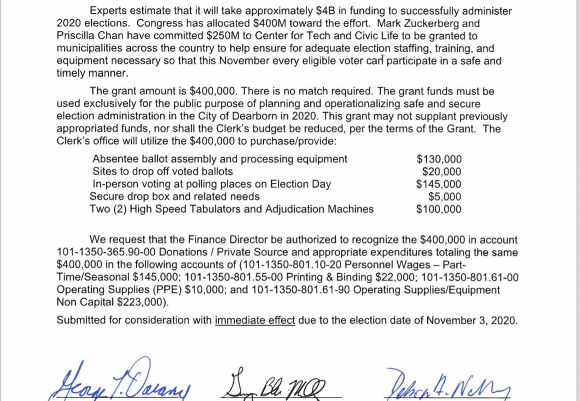
DEARBORN, Michigan— In anticipation of the presidential election, city clerks across Michigan worried they wouldn’t have enough ballot openers, tabulators, and poll workers to manage the unprecedented volume of mail-in votes. That was until they received help from Facebook founder Mark Zuckerberg.
Since September, Zuckerberg and his wife Priscilla Chan have made personal donations of $400 million to date, to help election offices across the country secure more staffing, training, and equipment to administer the November 3 elections.
The majority of that funding has gone to a Chicago-based nonprofit called the Center for Tech and Civic Life (CTCL) which is distributing the money through its “COVID-19 Response Grant Program.” CTCL is awarding grants based on a formula that weighs citizen voting age and other demographics factors in a given jurisdiction. According to CTCL, over 1,700 election offices have applied for these grants as of Oct. 1 including those in Saginaw, Flint and Lansing, Michigan.
Lansing is using the $443,742 it won to secure 12 new “safe and secure” drop-boxes, hazard pay bonuses of $100 for all-day election workers and high-speed tabulators that will count votes four times faster than in the August primary.
“This grant provided the ability to run an election without causing a huge financial deficit in a city that’s already overburdened with financial responsibilities due to the pandemic,” says Brian Jackson, Lansing’s Chief Deputy City Clerk.
Dearborn— one of several cities in Wayne County that applied for the grant— is using the $400,000 it won for two additional high-speed tabulators, hazard pay and personal protective equipment for poll workers. They’re also bringing up their personnel count from the 225 that worked in the 2018 gubernatorial race to 300 for election day.
Clerks across Michigan have taken to calling each other, curious to know which office received the most money.
During a special committee meeting on Oct. 1 in Dearborn, City Clerk George Darany shared how much Dearborn had won compared to neighboring cities with comparable populations. “So far Canton has not received anything though they’ve requested 130,000,” he said. “Westland is expecting if they do get a grant it’ll be about $50 or $60,0000. Livonia did get their grant and they got $130,000.” Flint, which has population size similar to Dearborn of around 95,000, received $475,625.
Conservative groups have protested the use of private donations to fund public elections. The Lansing State Journal reports that a conservative election group called the Election Integrity Fund is suing Lansing on grounds that CTCL funding poses an unconstitutional public-private “entanglement” that violates federal acts like the National Voter Registration Act.
The Thomas More Society, a conservative law firm based in Chicago, has launched the Amistad Project under which it has filed suits in federal court against communities in four swing states— Wisconsin, Minnesota, Pennsylvania, and Michigan— for using CTCL funding.
“We are fighting Mark Zuckerberg around the country where he is using CTCL…to funnel hundreds of millions of dollars to leftist strongholds in several battleground states to determine the outcome of the election,” Phill Kline, Director of the Amistad Project, told the AP on October 19. CTCL has denounced these claims as “baseless.”
Editor’s note: Because of the pandemic, we will be featuring stories from our student journalists reporting from other parts of the country periodically.
